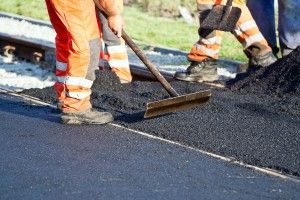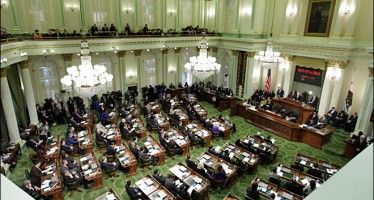Brown offers infrastructure compromise plan
 Shifting gears from a public hands-off approach, Brown gave California lawmakers his own take on how to reach an agreement over new infrastructure spending.
Shifting gears from a public hands-off approach, Brown gave California lawmakers his own take on how to reach an agreement over new infrastructure spending.
Brown’s proposal would impose $65 fees on drivers each year “and higher gas taxes to fund a $3.6 billion makeover for the state’s roads, bridges and highways,” as the San Francisco Business Times noted. “It plans to raise taxes on gas by 6 cents per gallon and 11 cents per gallon for diesel,” for an increase of some $1 billion in revenues:
“The increases will be based on the Consumer Price Index and will take $100 million out of the Department of Transportation’s budget. It also will look for $500 million from cap-and-trade revenue. […] Brown is hoping that will add up to $3.6 billion, with $1.6 billion slated for state highway improvements and $200 million doled out for improved trade corridors.”
The effort typified Brown’s approach to governance in his final term in office, working to strike a careful but forceful balance between restive Democrats to his left and enterprising Republicans to his right, eager for any opportunity to flex some political muscle. In a statement, spokesman Gareth Lacy underscored Brown’s hopes for another success threading the needle. “The administration’s proposal was put forth after engaging with Democrats, Republicans and lots of people who are concerned about adequate funding for our crumbling roads and highways,” he said, the Associated Press related. “It includes sensible reforms and sufficient revenue to improve our roads, bridges, public transit and trade corridors – all vital to boosting quality-of-life and economic competitiveness.”
Party politics
Seizing the opportunity to make a stand on principle, Sacramento Republicans immediately cast doubt on the plan’s future. “Brown gave the plan to Republicans on Thursday, but despite incorporating some of their proposals, the plan appeared unlikely to peel off Republican votes that would be required to boost taxes,” the Sacramento Bee reported. “The minority party has vowed to reject tax increases given California’s brimming budget, and party leaders in the Senate and the Assembly released statements on Thursday saying Brown’s call for increased taxes and a road user fee made his plan unsupportable.”
To Brown’s left, an adequate degree of support also seemed to be wanting. “While transportation, business and transit advocacy groups responded enthusiastically to the proposal, the Democratic governor did not appear to have secured the votes needed for a two-thirds majority in each house of the state Legislature, even from Democrats,” AP noted.
Yet Brown’s camp likely expected an initial wave of resistance among the contending parties in the Legislature. Both have a stake in sticking to their guns, and both have some room to negotiate going forward. Republicans, especially, faced sweeteners in the form of $500 million drawn each year from California’s cap-and-trade revenues, plus $100 million from so-called “efficiencies” to be found in Caltrans — “which Republicans have criticized as bloated and overstaffed,” according to the Bee.
Increasing urgency
But the degree of urgency surrounding a deal was set only to ratchet upward. Brown had patiently remained above the fray until this month. As late as August 19, Brown stubbornly — if wryly — refused to reveal any details about how, if at all, he intended to present the parties with a proposal. “I’m not going to put all my cards on the table,” he told a gaggle of reporters. “As a brooding omnipresence, I stand above the fray here.”
His decision to intervene now reflected a growing sense among political observers that, without some kind of nudge, lawmakers would be unable to arrive at a solution to California’s mounting infrastructure challenges. “Caltrans has deferred $59 billion worth of highway and bridge repairs. Cities and counties face an even bigger bill, needing $78 billion to return local streets to good condition. And the cost of fixing the roadways increases each year as pavement deteriorates and simple repairs turn into more expensive reconstruction projects,” the Los Angeles Times editorial board warned, opining in favor of Brown’s proposal.
Related Articles
Transparency measure appears headed to November ballot
A ballot measure aimed at increasing legislative transparency crossed a vital threshold on Thursday and appears poised to be on
'Mary Kay Tax' Mugs Small Businesses
JULY 27, 2011 By KATY GRIMES Call it the Mary Kay Tax. It hits small businesses — such as Mary
CA Unemployment System Is Broke
OCT. 29, 2010 By WAYNE LUSVARDI U.S. House minority leader Mitch McConnell, R-Kentucky, quipped in June of this year that



